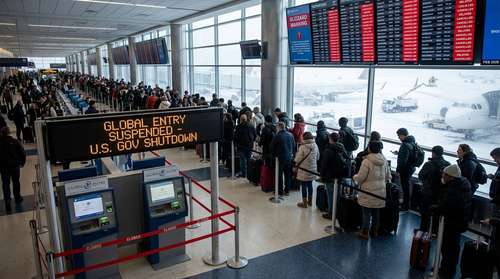Captivating coastlines scattered all over, the breathtaking view of Niagara Falls, the passionate appeal of ice hockey, and the pleasant, smiling faces of polite residents — let's face it, Canada is a beautiful country.
Canada is known for its breathtaking natural scenery and promising career prospects, which draws immigrants from all corners of the globe, especially Africa.
However, due to the rising cost of living, a growing number of immigrants are leaving Canada, which may come as a surprise.
This article aims to give newcomers or prospective immigrants to Canada a realistic perspective by providing insights into the challenges they may face upon arrival.
Financial Struggles and Immigration Outflows
The cost of living in Canada has reached staggering levels, prompting many immigrants, including permanent residents and Canadian citizens, to reconsider their decision to stay.
Southeast Asia has emerged as an attractive option for people who want to enjoy a more affordable lifestyle, thanks to its lower living expenses.
The high cost of living in Canada can create financial stress, which can harm the mental health of immigrants, making it difficult for them to thrive. Unfortunately, many individuals working hard to move to Canada are unaware of this.
Drug Crisis and Immigration Shifts
Certain areas in Canada, such as Vancouver's Chinatown and downtown East Side, have been grappling with a drug crisis, primarily involving fentanyl.
Moreover, the magnitude of drug overdoses, resulting in approximately 2,000 deaths last year alone, has raised concerns among immigrants.
Some talented individuals leave Canada for higher salaries and better career prospects, particularly in big tech companies in the United States.
Weather conditions and mental well-being
Weather conditions and mental well-being are another thing to consider, as this matters to some individuals, if not all.
The damp and rainy weather prevalent in Canada, particularly along the Pacific West Coast, can significantly impact an individual's mental health and overall well-being.
Adjusting to extensive periods of overcast skies can be challenging for immigrants and may contribute to homesickness or feelings of unease.
Housing affordability and immigration choices
Housing affordability is a significant challenge for many individuals who spend almost 50% to 70% of their income on rent.

Canada, with its lively cities such as Vancouver, offers an appealing option for those who can afford it and are seeking to settle down and start a family or plan for retirement.
However, the housing market's unprecedented price surge, driven by substantial investment activity, has startled many. Moreover, this housing affordability crisis poses a significant challenge for immigrants seeking stability and a place to call home.
Managing High Expectations, Job Struggles, and Adaptation
Many visitors to Canada arrive with lofty expectations, often influenced by misleading portrayals on platforms such as YouTube or by their friends or relatives.
It is critical to acknowledge that no country is perfect, including Canada. There are both advantages and disadvantages to living in any place.
Having unrealistic expectations can lead to disappointment and discourage individuals from adapting and persevering through the challenges of immigrating to Canada. Many newcomers struggle with finding employment and adjusting to life in a new country.
While immigrants harbor hopes of landing their desired jobs in Canada, the reality may not align with their expectations.
Many immigrants come to Canada believing that their multinational corporation experience will guarantee them similar positions in their respective industries.
However, this is not always the case, and they may face difficulties in securing employment. It is essential to recognize that finding a job in a specialized field may require significant time and effort, even if they have ample experience in their home countries.
Exploring opportunities in alternative sectors, such as retail or restaurants, may provide immigrants a starting point while they build their Canadian experience.
Confronting Other Immigration Obstacles
Canada endures long, frigid winters that can be challenging for individuals accustomed to warmer climates.
Moreover, adjusting to extreme cold temperatures, particularly in provinces like Ontario, Saskatchewan, or Alberta, can be a significant obstacle for newcomers.
Engaging in winter sports and activities like hockey, ice skating, skiing, or snowboarding can help make the most of Canada's winter season and mitigate the impact of the weather on mental well-being.
It is crucial for immigrants to understand that coming to Canada is not a guaranteed way to achieve quick wealth. Inflation has caused the cost of groceries and gas to rise, making it difficult to accumulate wealth rapidly.
Some individuals may find this financial burden overwhelming and consider leaving the country. However, with perseverance, dedication, and Canadian experience, immigrants can succeed and improve their financial situation over time.
Being far from home can be emotionally challenging, especially when financial constraints or time limitations prevent immigrants from frequently visiting their families and friends.
The initial phase of immigration, when newcomers arrive alone before being able to reunite with their loved ones, can often induce feelings of isolation. For some, homesickness becomes a significant factor in their decision to leave Canada.
Starting afresh is not always easy, even for individuals who hold managerial positions in their home countries.
Immigrants should be prepared to start at entry-level positions and gain Canadian experience before advancing their careers. It's essential to persevere during the initial challenges.
Conclusions
While Canada offers numerous opportunities, immigrants face challenges related to the high cost of living and other factors, contributing to many leaving the country.
Residing in Canada, particularly on the Pacific West Coast, entails navigating through incessant rainfall most of the year. This climatic feature has been known to adversely affect one's mental well-being, rendering it an unsuitable location for individuals seeking a sunnier locale.
The nightlife scene and prospects for social interaction in Canada do not bode well for young adults. Unlike countries with lively social locations, such as Thailand, Canada offers limited opportunities for meeting new people.
In recent years, individuals have opted to depart from Canada due to exorbitant housing prices, inadequate transportation options, and the arduous task of establishing meaningful connections, especially in cities like Vancouver.
By addressing realistic expectations, job struggles, climatic adjustments, financial difficulties, homesickness, and rebuilding lives, newcomers can navigate these obstacles positively and increase their chances of thriving in their new home.




